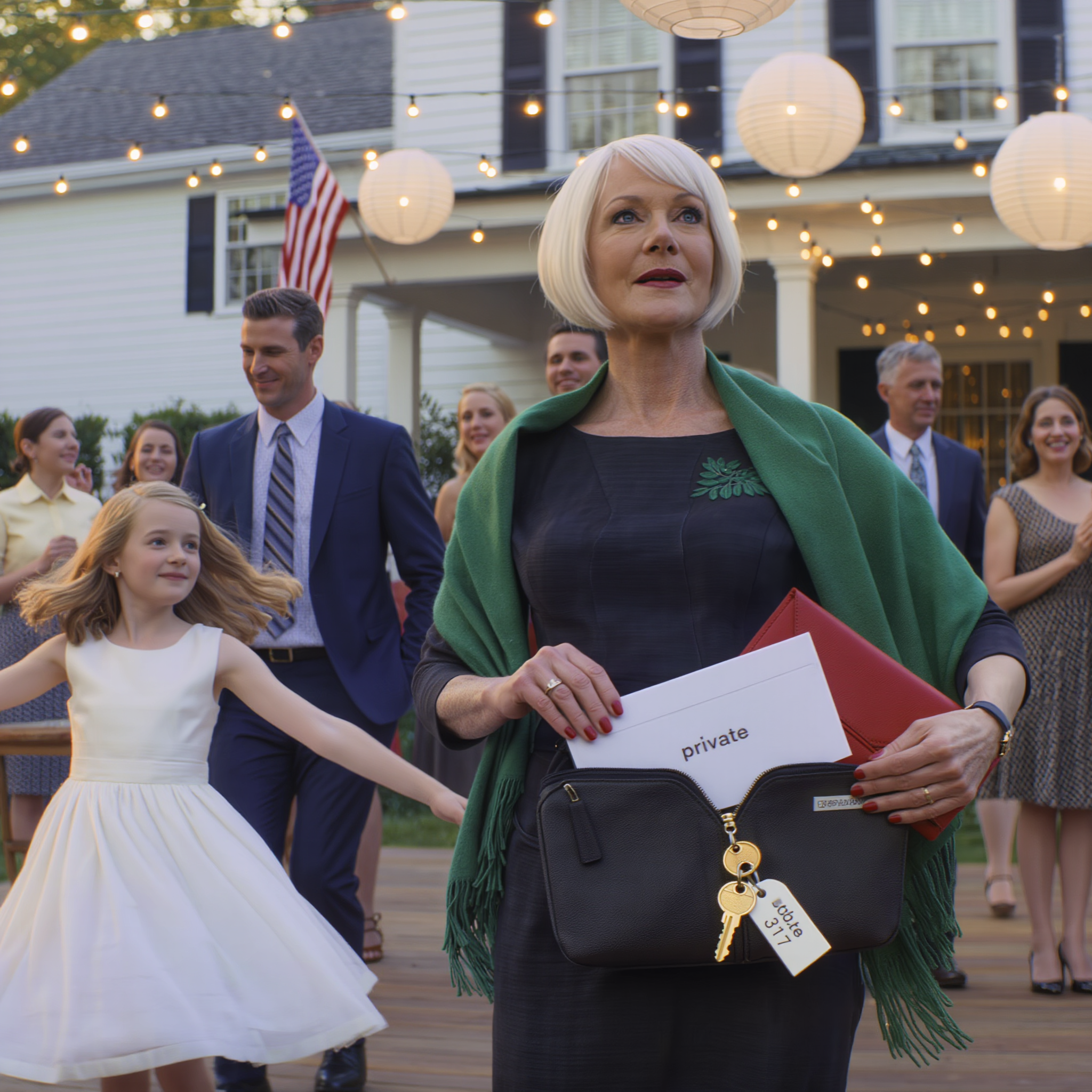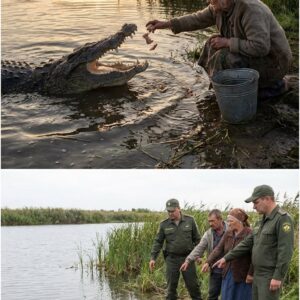
The air in my Charleston kitchen was still thick with the ghost scent of wedding cake and wilted gardenias. I had left the peony centerpieces by the sink, their petals collapsed into silky bruises. The house, usually a harbor of quiet, carried a new hum—afterglow and unease, the way a beach holds the hiss of a storm long after the thunder ends.
Across the polished mahogany table sat my daughter, Sophia. She still had the soft, ethereal glow of a bride two days married, a glow that made me ache with love and fear in equal measure. Beside her, her new husband, Julian Croft, lounged with proprietary ease. His arm draped along the back of her chair like he owned not only the seat but the future that came with it.
He slid a thick manila envelope across the table. It skidded to a stop just shy of my teacup—an offering or a demand, I couldn’t tell.
“This is just something we thought would make things easier, Eleanor,” he said. His voice was smooth, measured—honey that had learned the geometry of a banker’s office. “Asset alignment. Future planning.”
Sophia’s smile trembled with eagerness and trust. “It’s just a formality, Mom. Julian is brilliant with finances. We’re setting up a trust for when we have kids. You understand, right?”
A knot of ice formed low and tight beneath my breastbone. The envelope was heavy. On the front, typed in a crisp, impersonal font, was my full name: ELEANOR VANCE.
“Just take a look when you can,” Julian added, rising, already done with the conversation he had decided we’d had. “We’re off to Santorini tomorrow. This will save time later.”
I walked them to the door. Magnolia shade made a green lace across the brick, cicadas droning from the live oaks. He kissed the air near my cheek; she hugged me hard, the way she did when she was small and thought I could fix everything. Their car eased down the oak‑lined drive and vanished into the summer glare. Only then did I take the envelope to the kitchen and slit it open with the tip of a butter knife.
What spilled out was not a conversation. It was a verdict prewritten in someone else’s hand: a comprehensive financial agreement drafted as if I’d already consented to pour a significant portion of my assets into a newly minted Croft Family Trust, to be managed exclusively by Julian. The language was dense, the intent clear. A tidy funnel from me to him.
He had no idea what he was reaching for.
To most of Charleston, I was a comfortable widow with a beautiful house and a careful portfolio. No one saw the other ledger—the one my husband, Robert, had built in quiet rooms and offshore vaults, the one he made me promise to shield with more ferocity than grief. After Robert’s death, while casseroles cooled on the counter and neighbors spoke in the soft tones of the newly bereaved, I consolidated the discreet constellation of his investments into a single, staggering sum: seven million dollars. It sat, sleeping, inside a private holding account registered under a corporate name so plain it hid in broad daylight. No one could tie it to me. No one but me could wake it.
Thank God for Robert’s foresight, and for all the nights he’d taught me how to read the bones of a balance sheet the way sailors read stars.
I knew Julian’s kind—vultures in bespoke suits who called their hunger stewardship. I wouldn’t simply refuse him. I would lay out silver for him to admire and just enough copper for him to actually steal. He would walk into my trap smiling.
I drafted the outline of a decoy in my head—something humdrum, even disappointing. A false inheritance summary that suggested the well ran shallow and the water bitter. A fabricated transfer trail. Plausible, boring, small. Let him discover it. Let him try.
The next morning, a knock stabbed the quiet. On my porch stood a man with a briefcase and an expensive tan. “Mrs. Vance?”
“I am.”
“Marcus Thorne. I represent Mr. and Mrs. Julian Croft with respect to an urgent financial arrangement.” He said “Mrs.” like it was a trophy Sophia had won.
“My daughter’s name is Sophia Vance,” I said. “She kept her name.”
He blinked once, then smiled a polished smile. “Of course. May I?”
Against every instinct, I moved aside. He set his briefcase on my dining table like a surveyor unrolling maps over land he intended to redraw. “This document is a precaution,” he said. “Julian and Sophia have decided to combine their financial futures. This extends to any immediate family holdings that could benefit the trust.”
His finger landed on a paragraph: Section 7.2—Parental Estate Disclosures and Pre‑Inheritance Trust Structures. In plain English: Tell us everything. Present and future.
They were sniffing for seven million they didn’t know existed.
I glanced at Sophia’s signature—her quick, rushing hand, the same hand that once wrote me notes on pink paper: Don’t forget the bake sale. Love you. Had she even read this? “They’re young,” Marcus said, catching my look. “They trust each other.”
“Wrong answer,” I said, gentler than I felt. “Tell Julian he will have to wait. I don’t sign anything without my own counsel.”
A flicker of annoyance cracked his veneer. “When can they expect your response?”
“When I decide to give it.” I walked him to the door and shut it softly, as if ending a prayer I did not believe in.
I called Arthur Sterling. Robert’s closest friend. My friend. A man with a spine of oak and a lawyer’s appetite for precision. He listened without interrupting, the way only the very wise and the very dangerous do.
“You want me to review their papers,” he said at last.
“I want you to make new ones,” I said. “Draft a decoy. A legal‑looking summary of estate holdings that shows, after settling Robert’s debts, I was left with $240,000. Build a false but plausible transfer trail. Make it unimpeachable. Make it uninteresting.”
“You want them to think the well is shallow.”
“I want them to stop digging when their shovels hit clay.”
“And the real funds?”
“In a blind trust with you as the custodian of the custodian.”
He exhaled, a small laugh folded into the sound. “You were always a step ahead, Eleanor.”
By week’s end the papers arrived in a gray folder with the anonymity of a tax return. I left the file open on my study desk, just visible enough to tempt curiosity and just boring enough to lull it. Then I waited. On the fourth night, my phone pinged: a fraud alert from the bank. A flagged attempt to access an old, dormant joint account under my maiden name—an account only Sophia knew existed from when we once saved for a mother‑daughter trip we never took.
They weren’t sniffing anymore. They were digging.
I slept little. I set Julian’s contract beside the decoy and watched the two stacks of paper breathe in the ceiling fan’s slow churn. It was time to confront—but I wouldn’t meet him with anger. Anger is a gift to men like Julian. They turn it into evidence of your instability. Gratitude would do better. Gratitude would be unfamiliar terrain for him.
In the blue light of morning, I called Sophia. The Santorini connection stretched our voices thin, as if they were being drawn across the Aegean by hand.
“Sweetheart, when are you two back?”
“Tomorrow. Why?”
“Tell Julian I have the papers ready. I’ve had a chance to think. He’s right—we should align. Lunch at the garden café? My treat.”
“Oh, Mom! I knew you’d understand.”
I ended the call and stared at my reflection in the dark window: a woman who had learned to armor love with strategy. My phone chimed again. A text from Sophia: Mom, we need to talk first. Please don’t be mad—Julian said you threatened him.
Of course he did. Corner a thief and he will invent a fire to explain the smoke.
I rang Arthur. “They’re twisting it.”
“They would,” he said evenly. “Lunch still on?”
“Yes. But come as a friend. No briefcase. Watch and record.”
That morning, I walked the Battery before the city woke—salt in the air, brick sweating last night’s rain, iron balconies freckled with rust like old freckles reborn. Shrimp boats grumbled toward open water; a flag snapped against a pale sky; magnolia leaves held the light like lacquered hands. I breathed until the knot behind my ribs loosened. If I was going to cut a man out of my daughter’s life, I wanted the ocean to witness it.
We met under crepe myrtles dropping confetti onto the flagstones. Julian arrived in pale linen, the color of expensive sand. Sophia looked beautiful and exhausted. We ordered iced tea we did not drink. Arthur wandered in ten minutes later, in a seersucker jacket and the disarming smile of a man who never once mentions he is a lawyer.
Small talk limped along until Julian leaned forward, his expression deliberate. “Eleanor, I want to clear the air. I never meant to pressure you. I felt protective. Families are stronger when we… plan.” He reached into his leather folio and produced the same manila envelope. “Brought the paperwork, just in case.”
I set my handbag on the table, drew out the gray folder, and placed it atop his.
“This is my full inheritance disclosure,” I said. “Two hundred forty thousand dollars. After Robert’s debts.” I let the number fall between us like cutlery.
Behind Julian’s eyes I saw the calculus. That sum was too small to justify the risk he was already taking. Sophia’s face fell in confusion and hurt. “Mom… that’s all?”
“Your father had liabilities I never told you about, sweetheart,” I said softly. “I didn’t want you to carry them.”
A thin smile strained across Julian’s face. “Of course. Then we’ll be modest. Build slowly. Sensible annuities.”
“I’ll be rolling what’s left into one,” I said.
He stood suddenly. “Restroom,” he said, with a laugh that didn’t reach his eyes.
As soon as he vanished, Sophia leaned in. “Did you threaten him?”
“No. I told him I wouldn’t sign without counsel. That’s all.”
When Julian returned, he had a new stillness about him—the practiced calm of a man who decides to retreat only long enough to find a back door. Lunch ended in careful hugs. As they walked away, hand in hand, I felt no victory. I had survived a round. The match remained.
Two nights later my banker called. “There was a withdrawal request for the full $240,000,” she said. “Initiated through your old digital profile, using your daughter’s tablet. The IP traces to their hotel in Santorini.”
He had tried to take it all. The account he reached for was a decoy; there was nothing to lose but the proof of his reach. What shook me was the violation itself—his hands in my daughter’s passwords, his breath in the soft center of her trust.
I called Sophia. No answer. A text arrived half an hour later: Hey, Mom. We’re exhausted. Can we talk tomorrow?
Exhausted. Right.
By morning I was on the phone with Arthur. “He took the bait,” I said. “I need a digital trail.”
“Already moving,” he said. “IP, device signature, timestamp, credential flow. But Eleanor—we’re racing a clock I don’t control.”
I sent Sophia a message: Come to the house. Alone. Lemon cake’s cooling.
She came that afternoon, small in the doorway, eyes swollen from a sleep I doubted she’d had. We sat at the kitchen table where she’d once struggled through algebra while I made meatloaf and pretended fractions were a language I spoke.
“I need to talk to you,” I said. “Last night someone tried to empty my retirement account. It came from your tablet, from your hotel, while you slept.”
“No.” Her voice cracked. “He wouldn’t.”
“He did,” I said gently. “He found the summary I left out. And he went for it.”
“You set him up,” she said, tears flashing angry in her eyes. “You baited him.”
“I protected you. I had to know what he was.”
“This is insane.” She stood so quickly her chair scraped the wood. “You’re spying on us.”
“I’m trying to keep you from being robbed blind.” I rose, too, palms up. “Sophia—”
“He loves me,” she cried. “People do stupid things when they’re scared.”
“Then ask him why he was on your tablet at three in the morning.”
“He says you’re paranoid,” she sobbed, snatching her purse. “I can’t do this.” The front door opened and closed, leaving the lemon cake damp and bright on the counter like a sun we could no longer eat.
The phone rang. Arthur. “We have it all,” he said. “The forensics are clean. Credential flow from his device to the account. It’s him.”
“It won’t matter if she hates me,” I said.
“She won’t,” he replied. “But if we’re going to break the spell, we need a mirror he can’t fog. Send me the wedding videos. Men like Julian preen for the camera. Pride is evidence that volunteers.”
That night I watched hours of footage. Toasts and bad dancing, the lace of Sophia’s veil moving like water. And then, there it was, captured by a groomsman’s phone: a circle of men under bistro lights, whiskey glowing in their glasses. “So what’s next, man?” someone asked. “You married rich?”
Julian laughed, lifted his drink, and said, loud enough for posterity, “Not yet. Give me a month. You’ll see.”
I paused the video on his smile—the kind that counts without moving lips. I sent the clip to Arthur. His reply came instantly: Got it. Gold.
In the morning I drove to their condo. At the intercom, Julian’s voice crackled, flat. “She doesn’t want to see you.”
“I understand,” I said, and slid a small USB drive—wedding memories and a confession—into their brass mailbox.
Two days later, Sophia appeared at my door. She looked like a storm that had finally decided where to rain. “I watched the video,” she whispered, and the words stripped her to truth. “He said it was a joke.” She swallowed. “I checked his browser history on the tablet. ‘How to access trust funds.’ ‘Bypass two‑factor authentication.’” She exhaled, a small, ragged sound. “Mom, I’m so sorry.”
I crossed the room and she fell into me the way she did the day her father died, as if my shoulder was the last good shore.
Her phone buzzed. She glanced at the screen and went very still. “It’s Julian,” she said. “He says he’s lawyered up. If I try to leave, he’ll sue me for fraud.”
Of course. If he couldn’t steal from me, he’d bleed her with paper.
“Not on my watch,” I said. I called Arthur. “He’s threatening litigation.”
“Good,” Arthur said. “Then we stop asking and start telling.”
He already had a report assembled—the IP logs, device signatures, the clip with the whiskey and the promise. We arranged a meeting at a neutral law office with views of the harbor that made the city look gentler than it is.
“Stay home if you want,” I told Sophia. “You don’t have to see this.”
“I do,” she said. “I need to see his face when I’m done being his alibi.”
We arrived early and sat in a conference room where expensive chairs waited like patience. Julian came ten minutes late, swagger muted to a strut. His smile faltered when he saw Arthur in the corner, sleeves rolled, looking like a kindly uncle who happened to read statutes for sport.
Arthur handed him a folder. “A courtesy copy.”
Arthur’s tone stayed almost conversational. “Since we’re clarifying expectations: South Carolina treats undue influence and spousal coercion very seriously—especially where financial instruments are involved. We maintain a clean evidentiary chain: IP logs, device signatures, time‑stamped access, and your recorded statement establishing intent and timeline. You’re not on trial today, Mr. Croft—but if you insist, you’re curating our exhibits.”
Julian flipped. His color drained, returned, drained again. “There’s no crime here,” he said, enthusiasm misplaced. “Not technically.”
“Not yet,” Arthur agreed. “But we have enough for inquiries you don’t want. Identity misuse. Fraudulent coercion. And your voice, on video, describing timeline and intent.”
Julian’s gaze snapped to Sophia. “You told them.”
She held his eyes, steady. “No, Julian. You did.”
He slammed the folder shut. “What do you want?”
“You will disappear from our lives,” I said. “You will sign a full annulment and release Sophia from any claim, present or future. No court. No spectacle.”
He laughed, brittle. “Or what?”
Arthur set a second folder on the table. “Or we file what we have. We share what we can share. We had coffee with a reporter who finds patterns of predation… compelling.”
He was cornered. He knew it. He looked for the crack in my daughter that he had used before. Sophia reached calmly into her tote, took out a pen, and set it between them. The pen gleamed like a tiny sword.
He hesitated, the pen hovering—then the tip kissed paper. A bloom of ink, the tiniest tremor. He signed the first page with a flourish meant for cameras, the second with efficiency, the third with a sheen of sweat at his temples. By the fifth, his name had thinned to wire; the sixth clipped itself short, a signature trying to outrun its owner. Page after page. Each signature smaller than the last. When he finished, he stood, smoothed his jacket, and left without a word.
Silence filled the room the way light fills a church after the door closes on a funeral. Sophia’s breath shook; then she folded into me and cried the kind of tears that wash not just the eyes but a year of bad weather from the soul.
“It’s over,” I whispered. “You’re safe.”
She pulled back, eyes red, mouth determined. “Not until I fix what I broke with you. I doubted you.”
“You believed in love,” I said. “That’s not a crime. That’s proof your heart still works.”
That night we cooked pasta in my kitchen. The lemon cake finally found plates. The house warmed the way houses do when the people inside them decide to tell truths at last. After dinner, she asked the question that hovered like a moth above a lamp.
“Is it true?” she said softly. “About the money?”
I took a breath I hadn’t realized I’d been rationing. “Yes. I inherited seven million.”
Her eyes widened, not with greed but with the kind of awe that hears numbers as responsibility, not prize. “Why didn’t you tell me?”
“Because I wanted to protect you—from men like him, and from what that kind of money can make people become.”
She reached across the table and squeezed my hand. “From now on,” she said, voice steadier than I’d ever heard it, “no more secrets.”
We sat with that vow between us like a key we had both finally earned. In the weeks that followed, I moved the real money into a structure designed to protect her future self from her present optimism: a blind trust with triggers no charmer could pry open. Arthur drew papers the way shipwrights draw hulls, to keep us afloat through seas we’d yet to see. Sophia changed her passcodes and the architecture of her hope. The condo emptied. The annulment finalized quietly, like a candle pinched between finger and thumb.
One evening, we walked the Battery as the tide came in, gulls stitching the sky. Sophia slipped her arm through mine the way she had when she was little and lightning scared her. “Dad would’ve hated him,” she said.
“Dad would’ve taught him manners,” I said. “Then hated him.”
She laughed, the sound bright and clean. “I want to do this right, Mom. I want to earn my own future. And… when you’re ready, teach me what Dad taught you. About the stars in the numbers.”
“I will,” I said. “We’ll do it together.”
It struck me then that the true inheritance Robert left me wasn’t the money. It was a way of seeing: where danger pretends to be kindness; where love must be defended without becoming suspicion; where strength wears a quiet face and keeps the ledger of what matters. Seven million buys comfort. Wisdom buys freedom.
At the end of summer, we hosted a small supper in the garden—no tuxedos, no speeches, just friends and a sky the color of mercy. We passed bowls and laughed and told the kind of stories you tell when you have lost a version of your life and gained a better one. When the cicadas started up and the hydrangeas blue‑shadowed the paths, Sophia stood, lifted her glass, and said, “To love that is honest. To money that behaves. To women who refuse to be fooled.”
After the guests left, she helped me stack plates in the sink. The house was quiet again. No ghosts this time—just the good hum of a home that knows it has done its work. She kissed my cheek. “Good night, Mom.”
I watched her walk down the hall with the calm of a person who has learned to keep her keys where she can find them. In the stillness, I touched the edge of Robert’s old ledger, the one I keep on the top pantry shelf where flour used to live, and I smiled. For the first time since the wedding, the air felt clean.
The true inheritance had never been a number. It was the clarity to count what counts, and the courage to protect it. And that, finally, was a fortune I could safely share with my daughter.
In the days that followed, life resumed its ordinary disguises. I watered the basil on the windowsill; I took the trash out on Tuesday; I returned a casserole dish to Mrs. Pennington next door and lied that I’d loved the crushed‑chip topping. But beneath the slow rituals, a new current moved. I could feel it in the way the house breathed—lighter, but also watchful, as if the walls had decided they were on our side now.
There were practical things to do. Arthur and I met at his office, a space lined with books whose spines were broken only by his habit of rereading the law he already knew by heart. He slid a stack of documents toward me.
“Guardrails,” he said. “For the trust. Your daughter is beneficiary with delayed distribution triggers—age, milestones, audits. There are emergency clauses that allow you to act if someone exerts undue influence again. I’ve added language to keep predators bored.”
I skimmed the phrases that would one day be our quiet soldiers: spendthrift provision, discretionary standard, independent trustee, forensic audit on suspicious requests. “Bored predators,” I said, almost smiling. “My favorite kind.”
He leaned back. “There’s one more piece. We can’t control Julian’s next move, but we can shorten his reach. I’ve filed a notice with the bank consortium. His credentials will ping a wall now. It won’t stop a determined man, but it will slow a lazy one.”
“Julian is lazy in the ways that matter,” I said. “He works very hard at shortcuts.”
On my way home, Charleston looked sharpened—rain had rinsed the heat from the streets, and the city exhaled. The market was a ribbon of voices; the carriage horses wore their dignity like harness. I parked and walked the long way under live oaks that knuckled the sidewalks. At the corner, a little boy was trying to tie his shoe while his father talked into a phone, not seeing. I crouched, tied the laces, and remembered every morning I had done the same for Sophia before school, her hair a fountain I tried to tame with a ribbon. You can protect a child’s ankles from a fall; the heart, you can only teach to stand back up.
That evening, Sophia arrived with a notebook and three pens, as if she were coming to class. “You said you’d teach me,” she said. “Not just about what Dad left—but how the world works when money is the language it speaks.”
We started at the beginning. Robert used to say that numbers tell stories, and if you listen, you can hear the plot twist before the villain does. I drew boxes for assets and arrows for cash flow and circles for the places bad actors hide. We built a ledger for a dream bakery Sophia had once doodled about in a teenage journal—flour costs, rent, payroll, the price of a good butter and the better butter a customer will taste but never name.
“Numbers, not vibes,” I said, writing. “If a croissant costs $1.05 in ingredients and labor is $0.90 per unit at 300 croissants a day, fixed costs run $280 daily—rent, utilities, insurance—then your break‑even is about 233 croissants if you price at $3.25. Price at $3.75, and every extra fifty you sell covers a rainy Tuesday. That’s how you stay solvent, not just busy.”
She grinned. “Rainy Tuesday insurance. Got it.”
“Debt isn’t evil,” I told her. “It’s a tool. The question is who holds the handle.”
“Julian held mine,” she said softly.
“For a minute,” I said. “You took it back.”
She smiled then, a small, growing thing. “Teach me blind trusts next.”
We worked until the windows mirrored us and the kitchen smelled of coffee. Near midnight, she closed her notebook and looked toward the hallway where Robert’s old ledger lived above the flour that no longer did. “Do you miss him more when we talk about money or less?” she asked.
“Both,” I said. “He was never more himself than when he was careful on our behalf.”
The days folded into a new kind of routine. In the mornings, we walked the Battery before heat woke up; in the afternoons, she updated passwords, froze credit, sat on hold with the blank voices of customer service while I made sandwiches and slid them toward her with a raised eyebrow. At night, she slept in the guest room with the door slightly open, and I listened to the house make the noises that houses make when they are practicing being safe.
One afternoon, a letter arrived addressed in a careful, unfamiliar hand. Inside, a single sheet on heavy paper: Ms. Vance, I apologize for my role in delivering documents that were not explained to you fully. I have resigned my position with Croft & Thorne. If you require a statement, I will provide one. Marcus Thorne.
I stood at the kitchen counter and read it twice. There are men who will only ever be instruments; there are men who, given the chance, will choose to stop being weapons. I slid the letter into a folder marked Keep and felt the soft shift of a future slightly improved.
Arthur called. “We received a notice,” he said. “Julian retained counsel to inquire about the possibility of contesting the annulment. The inquiry was withdrawn thirty minutes later. My guess is his new counsel read what his old arrogance ignored.”
“What becomes of a man like that?” I asked, not really wanting an answer.
“He finds a new stage,” Arthur said. “Or he learns the trick wasn’t the stage.”
A week later, on a quiet Monday, Sophia and I drove to Summerville to visit Robert’s favorite charity—a literacy program tucked into a red‑brick building that smelled like crayons and paperbacks. In the back room, a girl with braids sounded out the word nevertheless and smiled with her whole face when she found the rhythm. I asked the director for their wish list and left a check that would turn wishes into inventory. On the way out, Sophia squeezed my hand. “This feels like Daddy more than any portfolio ever could,” she said.
We were halfway home when she said, “He used to whistle when he did the taxes.”
“Off‑key,” I said.
“Terribly,” she laughed, and we let the memory open its windows.
News travels strangely in a town that prides itself on minding its business. People do not ask; they imply. At Harris Teeter, a woman I barely knew complimented my tomatoes and then remarked that she had always thought Julian’s socks were too loud for his suits. “That sort of thing announces itself,” she said, selecting a cucumber with great concern. I nodded and said something about the weather. It was enough. The world would take care of its gossip without my help.
Yet gossip has a way of turning into warning bells in the right ears. A month after the annulment finalized, a friend of a friend called to say Julian had been seen having lunch with a woman who wore diamonds like a language. “You don’t know her,” he said, “and I don’t recommend it.” I didn’t need the caution. I was done carrying the burden of other people’s lessons. But that night I scribbled three lines on an index card and slid it into Sophia’s notebook: Good men don’t rush you. Paperwork is not intimacy. Protect your passwords like you protect your pulse.
We kept learning. Not about fear—fear is a teacher that only repeats itself—but about structure. We set up a donor‑advised fund in Robert’s name. We added the literacy program and a women’s shelter and the legal clinic that had once helped a neighbor leave a situation she’d been told was love. We wrote the kind of checks that make a thing real, and we visited often enough to see what money cannot do and what it can.
One evening on the porch, thunderclouds stacked themselves like dark books. At 12:37 a.m., her phone chimed—an email from one of Julian’s old friends, the same man who had laughed in the wedding clip. A paragraph of apologies and admissions, ending with: We should have stopped him. She read it twice, turned the screen face‑down, and let silence be her reply.
“Shame arrives late,” I said. “But sometimes it still shows up.”
She nodded. “Do I have to answer?”
“You don’t have to do anything you’ve already survived,” I said.
We let the storm come. Rain stitched the garden. The world smelled like iron and forgiveness.
In September, I took Sophia to the bank where Robert had first taught me that vaults are not where wealth lives—it lives in decisions. We met with our new advisor, a woman with a mathematician’s calm. Sophia asked smart questions about ETFs and tax‑loss harvesting and the difference between being rich and staying solvent. We rebalanced. We diversified with a discipline that would have made Robert’s off‑key whistle crack a smile.
After the meeting, we walked past the safe‑deposit boxes, that museum of careful people. “Our lives fit in there, once,” she said.
“They never did,” I answered. “We just thought the important parts would be easier to carry if they were small.”
On a cool Saturday, we held a yard sale—a quiet ritual of shedding. We sold the pastel duvet cover Julian had insisted on, the espresso machine he believed made him interesting, the set of steak knives that never quite cut as promised. The neighbors came, and their quarters and dollar bills piled up in a cigar box that had once belonged to Robert. A girl chose a stack of cookbooks and said she would learn to make everything in them. I threw in a bundt pan for free. Afterward, Sophia and I took the money to the literacy center and asked for a tour of their storage closet. We left with shelves that held more than paper.
That night, after dishes and the slow joy of a football game humming in the background, Sophia asked, “Do you ever wish you’d told me about the seven million sooner?”
“Yes,” I said, because truth deserves air. “And no, because I know who I needed you to become before money had a vote.”
She considered that. “I want to be the kind of person who could have known and been the same anyway.”
“You’re becoming her,” I said.
A letter came from a reporter a few weeks later, polite and precise, asking if I would speak on the record about coerced financial control in marriages. I declined the interview and sent a donation to a nonprofit that funds legal representation for women who cannot afford Arthur Sterlings of their own. I wrote a note in my slanted hand: Use this to keep someone else from signing away her light.
Autumn finally arrived, tired of pretending to be summer. The air found its crispness. We threw open the windows and let the house remember its better smells—apples, cinnamon, the clean bite of cold morning on warm wood. On the first truly cool day, Sophia put on a sweater of Robert’s that I had saved—navy, elbows gently worn. She made coffee and stood in the door to the backyard where the lemon tree was taking a breath between fruit. “I don’t hear him anymore,” she said softly. “I think I hear me.”
“Good,” I said, my throat tight in the way gratitude tightens it. “Make room for the life you saved.”
One more practical matter remained. We met with a notary and signed a document I had put off for years—the letter to accompany my will. Not the legal parts; those were clean. The letter that told the story money cannot hold: what to keep and what to give; why the chipped mixing bowl mattered more than the crystal; the recipe for the lemon cake and the reason for the ledger on the pantry shelf; the names of people who had loved us well and the names of those whom we had forgiven for not knowing how.
When it was done, Sophia pressed the paper flat with her palm. “This is the map,” she said.
“It’s your compass,” I said. “Maps change. North remembers.”
That evening, a message arrived from an unknown number: New number. Thought you should know I’m moving to Houston. Take care. —J. A week later, a former client mentioned—casually, the way people set their cups down—that the firm had “reorganized” after a compliance review and certain accounts were no longer welcome. I did not ask which accounts. Some rumors are simply labels you place on a box you’ll never open. I stared at the screen long enough for my thumb to forget what it wanted to do. I deleted it. Some things do not require an archive.
We kept going. That is the secret nobody tells you about surviving: there is no grand finale, only better days acquiring neighbors. We cooked dinners we ate at the table. We remembered Robert without letting grief borrow the room rent‑free. We met Arthur for lunch sometimes and argued cheerfully about baseball. We called the literacy center to ask if they needed volunteers for their winter book fair and spent a Saturday handing out paper crowns to children who had earned them by sounding out the kingdom.
And on a Sunday afternoon tinted gold, Sophia looked up from her notebook, where numbers had finally started to look like allies. “Mom?”
“Yes?”
“When I have a daughter, I’m keeping my name.”
I laughed, the sound fuller than it had been in months. “Good,” I said. “Give her a name that fits on a ledger and a library card.”
We sat quietly then, letting the light do what light does at the end of honest days. The lemon tree held out one stubborn fruit as if it, too, had decided to wait for a better season. I reached across the table and took my daughter’s hand, and we did the simplest, bravest accounting there is: we counted each other, and we called it wealth.




